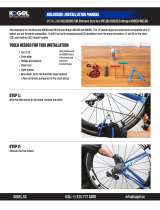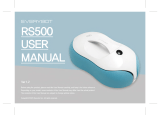
4
TO ENSURE SAFETY
TO ENSURE SAFETY
WARNING TO PARENT/GUARDIAN
•
For child safety, make sure the child uses this product correctly by following the instructions below. Both guardians and children should gain an
adequate understanding of the content of this manual. Failure to follow the provided instructions may lead to serious injury.
WARNING
•
Be sure to follow the instructions provided in the manuals when installing the product.
It is recommended to use genuine Shimano parts only. If parts such as bolts and nuts become loose or damaged, the bicycle may suddenly fall over,
which may cause serious injury.
In addition, if adjustments are not carried out correctly, problems may occur, and the bicycle may suddenly fall over, which may cause serious injury.
•
Be sure to wear safety glasses or goggles to protect your eyes while performing maintenance tasks such as replacing parts.
•
After reading the dealer's manual thoroughly, keep it in a safe place for later reference.
Be sure to also inform users of the following:
If the warnings below are not followed, your shoes may not come out of the pedals when you intend or they may come out
unexpectedly or accidentally, and severe injury may result.
•
SPD pedals are designed to be released only when intended. They are not designed to be released automatically when you have fallen
off the bicycle.
•
Before attempting to ride with these pedals and shoes, make sure you understand the operation of the engagement/release
mechanism for the pedals and cleats (shoes).
•
Before you attempt to ride with these pedals and shoes, apply the brakes, then place one foot on the ground and practice engaging
and releasing each shoe from its pedal until you can do so naturally and with minimal effort.
•
Ride on level ground first until you become accustomed to engaging and releasing your shoes from the pedals.
•
Before riding, adjust the spring tension of the pedals to your liking. If the spring tension of the pedals is low, the cleats may become
accidentally released and you may lose balance and fall off the bicycle. If the spring tension of the pedals is high, the cleats cannot be
easily released.
•
When riding at low speed or when there is a possibility that you might need to stop riding, (for example, when doing a U-turn, nearing
an intersection, riding uphill or turning a blind curve), release your shoes from the pedal beforehand so that you can quickly put your
feet onto the ground at any time.
•
Use a lighter spring tension for attaching the pedal cleats when riding in adverse conditions.
•
Keep cleats and bindings out of dirt and debris to ensure proper engagement and release.
•
Remember to check the cleats periodically for wear. When the cleats are worn, replace them, and always check the spring tension
before riding and after replacing the pedal cleats.
•
Do not continue riding the bicycle if the reflectors are dirty or damaged. Otherwise, it becomes more difficult for others to see you.
•
Use only SPD-SL shoes with this product. Other types of shoe may not release from the pedals, or may release unexpectedly.
•
Use only Shimano cleats (SM-SH10/SM-SH11/SM-SH12) and make sure that the mounting bolts are tightened securely to the shoes.
•
Be sure to attach reflectors to the bicycle when traveling on public roads.






















